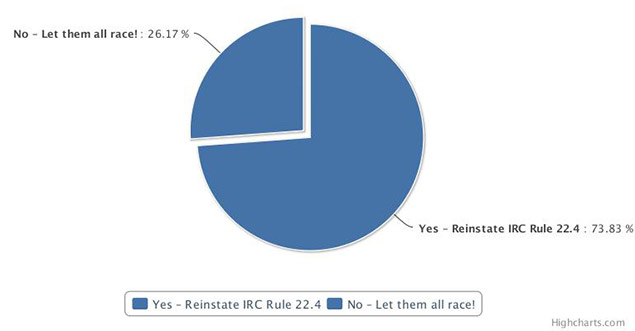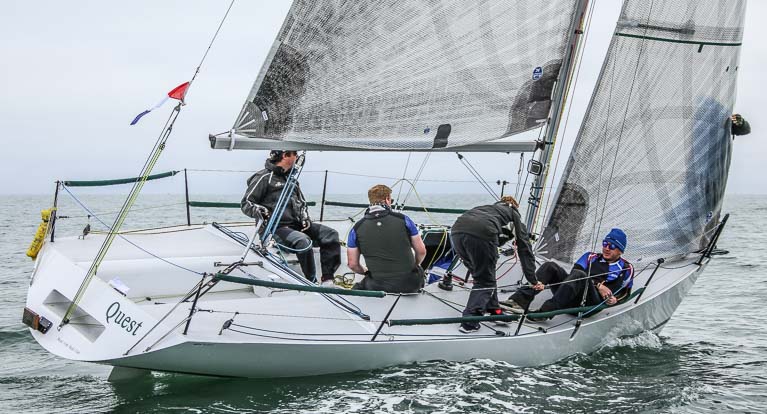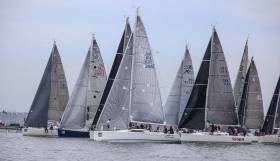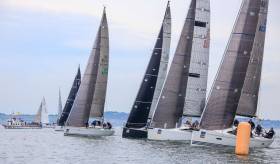Displaying items by tag: Crew limit
No Crew Limit for ICRA Nationals, IRC Rule 22.4 Stays Deleted for Royal Cork Championships
There will be no crew number limitations or crew weight limitations at this year's Irish Cruiser Racer (ICRA) Nationals at Royal Cork Yacht Club.
The rule had been 'under review' following discussion at March's ICRA Conference in Limerick where it was shown different regattas deal with crew weight limits in different ways.
Yesterday, ICRA Commodore Simon McGibney confirmed to Afloat.ie, 'There is no change to point five of the Notice of Race for this year's Championships'.
Point five says: Crew Limitations IRC Rule 22.4 is deleted. There is no crew number limitations. There is no crew weight limitations.
IRC Rule 22.4 says: “The Crew Number printed on each boat’s certificate shall not be exceeded or the crew weight shall not exceed 85kg multiplied by the Crew Number printed on the certificate.”
The decision brings clarity to a situation six weeks after a healthy debate on the issue at the national conference and six weeks before the championships is set to sail in Cork Harbour.
It means competing skippers are now free to invite as many crew as they wish and book accommodation at Crosshaven accordingly.
The focus of conversation at the conference, under guest speaker Mike Urwin of the RORC, was the disposal of crew limits at events such as the ICRA National Championships.
As the rule does not apply at the ICRAs, boats had an option to take less crew on a light wind day and stack the rail in breeze.
Traditionally, fun regattas like Calves Week, did not have crew limits, so that late crew members could be recruited from the quayside and children could also be accommodated as required.
The move to delete the limit rule followed significant consultation with sailors and ICRA surveys found overwhelming support for its withdrawal.
However, the meeting heard that for 'serious regattas', such as a national championships, not having a crew limit can lead to advantages to those who bring a large crew pool to an event, thus upping overall costs of participation.
Some delegates believed championships should stick to the IRC certificate crew limit or maybe the 'cert plus one'. Others thought a stipulation in the Sailing Instructions requiring the same crew numbers in every race would be helpful.
An Afloat.ie reader poll following the conference (running from March 9 to April 25) recorded answers from eight countries, with 45% of respondents from Ireland.
The poll asked: 'Should there be a crew limit at ICRA 2017?' Answer options: No – Let them all race! or Yes – Reinstate IRC Rule 22.4. There was a strong result (73%) for the reinstatement of IRC Rule 22.4.
Results are below:

Crew number limits or crew weight limits at this year's ICRA National Championships are under review following discussion at last weekend's ICRA Conference in Limerick where it was shown different regattas deal with crew weight limits in different ways.
The focus of conversation, under guest speaker Mike Urwin of the RORC, was the disposal of crew limits at events such as the ICRA National Championships.
The 2017 ICRA Notice of Race states 'IRC Rule 22.4 will be deleted'. This rule says: “The Crew Number printed on each boat’s certificate shall not be exceeded or the crew weight shall not exceed 85kg multiplied by the Crew Number printed on the certificate.”
As the rule does not apply at the ICRAs, boats have an option to take less crew on a light wind day and stack the rail in breeze.
 The Quarter tonner Quest in light air mode for the 2016 ICRA Championships at Howth. Photo: Afloat.ie
The Quarter tonner Quest in light air mode for the 2016 ICRA Championships at Howth. Photo: Afloat.ie
Traditionally, fun regattas like Calves Week, did not have crew limits, so that late crew members could be recruited from the quayside and children could also be accommodated as required.
The move to delete the limit rule followed significant consultation with sailors and ICRA surveys found overwhelming support for its withdrawal.
However, the meeting heard that for 'serious regattas', such as a national championships, not having a crew limit can lead to advantages to those who bring a large crew pool to an event, thus upping overall costs of participation.
Some delegates believed championships should stick to the IRC certificate crew limit or maybe the 'cert plus one'. Others thought a stipulation in the Sailing Instructions requiring the same crew numbers in every race would be helpful.
The ICRA Executive is to review the comments made on the day, and a decision on the situation for the Royal Cork championships in June will be made 'sooner than later', ICRA Commodore Simon McGibney told Afloat.ie.
'ICRA have taken on board comments and will review the discussions before any final decision is made'
Should there be crew limits? Have your say in our reader poll below. POLL EXPIRED.





























































